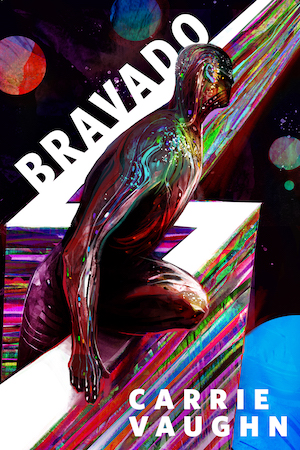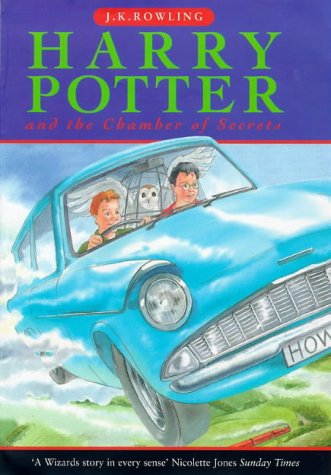After you’ve defeated a Dark Lord, come home and found life goes on as normal, how do you return to faerieland? How do you get back to Narnia? How do you make something feel even more magical and wondrous than when it was brand new?
Well, a flying car and a murderous tree is a pretty good way to start.
Harry Potter and the Chamber of Secrets was one of the very first “what happens after” books I’d read. Harry Potter and the Philosopher’s Stone was a great adventure book in which the boy turns out to be a wizard, a celebrity, a hero, and then defeats the Dark Lord all over again. But Chamber of Secrets shows what happens next and that fascinated me.
And then there was the psychology of a budding Dark Lord, an ambiguous, strange elf-creature, a truly fabulous dueling club, the history and redemption of Harry’s first friend and, of course, Lockhart.
I read the first Harry Potter book when I was about 12, after the first couple had come out and while I was attending an English public (private for Americans) school, so I connected with them pretty strongly from the beginning. (I still have those, now very beat up, paperbacks.) The first one was a really fun romp, but the second grabbed me, if possible, even more. It was darker, smarter and a really intricate mystery for a twelve year old (Harry and myself) to solve.
From the beginning, it seems like Harry’s charmed life is taking some heavy knocks, with Dobby attacking him, missing the train, the whomping willow attacking, and then being punished for being late before the school year had really begun. It made him much more like a real boy—who screws up plenty—but also places him in a precarious situation from the get-go. There is no triumphant return with trumpets lining his path to Hogwarts, but instead Harry has to start out fighting.
Then we learn Harry can talk to snakes. The Parseltongue, and particularly Harry’s connected-to-Voldemort dreams, are Rowling’s genius in this book, as we’re left unsure who to trust and whether Harry could, possibly, be in some way connected to the attacks on the students. It’s a neat trick in that it makes us have exactly the same questions and insecurities that Harry faces throughout this book as people turn away from him, adulation becomes notoriety and distrust, and he becomes so much more alienated from the rest of his class. Just as the first book has Harry asking questions about the magical world for our edification, in this one, his own uncertainty about the attacks on fellow students and whether he’s responsible, leads us down the same questioning path.
One of the hardest things in many children’s books is the betrayal of the adults; when they are neglectful, abusive or even downright evil. Snape is, throughout the earlier books, a child’s villain—he is obviously significantly more complex, but seen through our hero’s eyes, he’s cruel and mean in very black and white ways—whereas, Lockhart, here, is a grown-up who lies, endangers people, and wants to use Harry for his own, incredibly selfish ends. With adults like these on other side, and the “good” ones—like Dumbledore and McGonagall—punishing him at the very beginning of the year, on the other, Harry begins to feel like he can only rely on the students, and particularly the Trio. It’s quite a subtle—for what is still a middle-grade book at this point—maneuvering and drawing of the battle lines that doesn’t really surface until much later in the series.
Plus, as we learn towards the end of the book (or earlier, if you’re better at whodunit mysteries than I was at 12), Lucius is pretty much out and out evil. It’s one thing to have this interesting fight between a young not-yet-Dark Lord version of Tom Riddle and Harry, when they’re about the same age, and it was a lovely, classic, way to do it without time travel, or to have Lucius and Arthur fighting, but to have Draco’s father attack another man’s daughter like that felt huge. For a grown man to deliberately set out to destroy a small girl is a dark, big thing for a narrative that’s only just growing beyond an adventure story. Consequently I cheered hugely when Harry releases Dobby from Lucius’ service; not only because I wanted Dobby to be free, but because any way to lash out at Lucius seemed like a victory to me—almost more so than defeating Tom, who was at least Harry and Ginny’s peer in some fashion.
And then there’s Hagrid. Part grown-up, part child, part magical creature himself; he’s Harry’s saviour in many ways and certainly his first friend, so his redemption as Harry discovers that he didn’t open the Chamber of Secrets and he certainly didn’t kill Moaning Myrtle is a big relief. But not an untempered one, as we meet Aragog and find that Hagrid really can’t be entirely trusted, though at least in his case it’s unthinking, rather than cunning or evil. Hagrid just doesn’t understand how the magical creatures he loves so much could be dangerous and awful, which made me really question whether, perhaps, his long-ago punishment wasn’t quite unmerited. I loved Hagrid and I was certainly sad that he was expelled and barred from magic, even though I discovered it retroactively, but while he didn’t kill Myrtle, Aragog certainly could kill someone and his unconcern on that score was kind of terrifying. And I don’t even have Ron’s fear of spiders!
While I’m talking about magical creatures, briefly, I want to jump ahead and say that I’ve mourned the fate of the basilisk for years. I recognise how problematic a creature that kills with its eyes can be, but it totally wasn’t the snake’s fault. Why couldn’t Harry have killed evilyounger!Tom and told the basilisk just not to kill people anymore? (Yes, I recognise my faulty logic here. Mourning anyway.) In addition to the brilliance of the entire set-up with the Parseltongue, the snake—and how it moved through the walls—and the attacks, I loved Rowling’s inventive and careful use of mythology. I remember, after this book, discovering that basilisks were, well if not “real” then at least “existing outside of Harry Potter” and it was so exciting. It sent me on quite a quest to read more about Medusas and Basilisks, though it seems to generally end poorly for them, sadly for me.
While all this adventure and intricate world-building is going on, Rowling also, subtly, delves into themes of prejudice—against Hagrid, against elves and even against girls (though this last is severely problematically handled) and definitely against Harry, the minute he shows non-Gryffindor characteristics—and distrust of the establishment, which is the foundation of the rest of the books.
And there are absolutely problems with the girls in this book. Hermione is petrified, essentially because she is smart and curious. Ginny is sucked into an abusive relationship with the diary—and Riddle—because she wants someone to listen to her—she wants a voice. And poor, poor Myrtle is killed, ridiculed and still not taken seriously long after her death. But for all their lack of agency at points, this book gave me a triumvirate of smart, powerful women who want things and strive for things so intensely that they have to be noticed. They are, in some ways at least, rewarded for their struggle to prove themselves—if only with attention—and it inspired twelve-year old me to want more and push harder to get ahead. And that is what draws me back to Harry Potter and the Chamber of Secrets time and again.
Nina Lourie has totally, while in bed at night, waved her hand and said “Nox” instead of flicking the light switch. But whether it worked is a secret.










